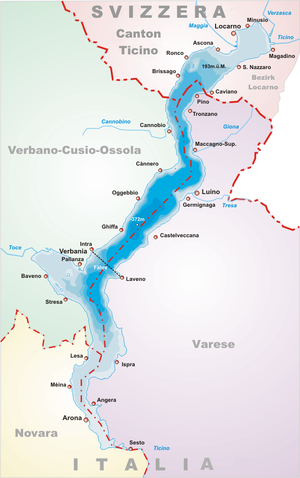Lake Maggiore (Lago Maggiore or Lago Verbano) is a large lake on the south side of the Alps, mostly in the Italian Lake District and the northern part in Switzerland. The west side of the Italian part is in the Piedmont region and the east side in Lombardy.
Understand
Lake Maggiore is the second largest lake in Italy. With a length of 68 km and a coastline of over 150 km, the glacial lake stretches from the Swiss canton Ticino in the north into two major Italian regions, Piedmont and Lombardy. Since the climate is mild year-round, the area is filled with Mediterranean vegetation and exotic plants. Surrounded by beautiful lakeshore towns and villages with lush botanical gardens, amazing islands and a backdrop of Swiss mountain peaks, Lake Maggiore has become a top tourist destination, mainly for central and northern Europe tourists.
Regions and cities

The western part of the lake is in the Italian region of Piedmont. From north to south:
- Cannobio – small town 10 minutes from the Swiss border, with a Sunday market, a renaissance church, and a lakeside walkpath
- Cannero Riviera – nice town, with abandoned island (Castle of Cannero)
- Oggebbio
- Ghiffa
- Verbania – large town that includes Pallanza
- Baveno
- Stresa
- Belgirate
- Lesa
- Meina
- Arona
- Dormelletto
- Castelletto sopra Ticino
The eastern part is in the Lombardy region in the Province of Varese. From south to north:
- Sesto Calende
- Angera
- Ranco
- Ispra
- Brebbia
- Besozzo
- Monvalle
- Leggiuno
- Laveno-Mombello
- Castelveccana
- Porto Valtravaglia
- Brezzo di Bedero
- Germignaga
- Luino – town of 14,000 inhabitants with a famous weekly market
- Maccagno – small town of 2,000 inhabitants
- Tronzano Lago Maggiore
- Pino sulla Sponda del Lago Maggiore
The northern part of the lake is in the Swiss canton of Ticino.
Other destinations
- Borromean Islands - a group of three stunningly beautiful small islands and two islets located between Verbania to the north and Stresa to the south
- Brissago Islands - two islands located in the Swiss part of the lake close to Ronco sopra Ascona and Brissago.
- Castelli di Cannero (three small islands just off shore from Cannero Riviera)
- Isolino Partegora (in the gulf of Angera)
Get in
By train
Several train services run to parts of Lake Maggiore.
- S30. TiLO operates trains from Milano Malpensa Airport Terminal 1 up the eastern side of the lake to Bellinzona in Switzerland, north of the lake. The first lakeside town it stops at is Laveno. It then stops at Caldè - Porto Valtravaglia - Luino (compulsory stop with personnel changes FS/SBB) - Colmegna - Maccagno - Pino-Tronzano - Ranzo-S.Abbondio - Gerra (Gambarogno) - S. Nazzaro - Magadino and Bellinzona. Push the button for a stop. From Bellinzona there are services to Locarno on the lake. Trains come from the north through the Gotthard tunnel to Bellinzona, where you can change to the S30 or Locarno train.
- Milan–Domodossola. Trenord operates trains from Milan, via Gallarate (near Malpensa Airport) up the western side of the lake as far as Verbania-Pallanza station, before heading away form the lake to Domodossola and then Switzerland. Some services stop at fewer stations than others. The full range of stops on the lake is Sesto Calende, Dormelletto, Arona, Meina, Lesa, Belgirate, Stresa, Baveno, Verbania-Pallanza.
By plane
The nearest bigger airports are in Lugano and Milan. From Milano Malpensa Airport most parts of Lake Maggiore can be reached by bus or train.
- Alibus, ☏ +39 0323-552172, alibus@safduemila.com. A seasonal (Apr-Oct) on-call service that links both terminals of Malpensa Airport to the western side of the lake with stops in Arona - Meina - Solcio - Lesa - Belgirate - Stresa - Baveno - Feriolo - Fondotoce - Verbania Suna - Verbania Pallanza and Verbania Intra. Services are 2–3 hours apart. Book by 11am the day before departure (by 11am Sa for Monday trips), choosing from the fixed timetable. Buy tickets on board, cash only. €15 to Verbania.
Get around
By ferry
Passenger ferries run up and down the lake. Services are provided by Navigazione Laghi (NLM). Check the website for the latest schedules.
As well as passenger ferries, a car ferry crosses between Intra in Verbania on the western shore to Laveno-Mombello on the eastern shore.

